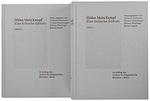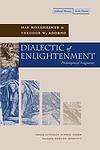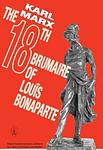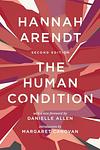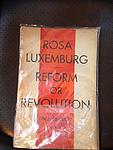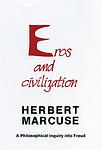The Greatest German "Political, Nonfiction" Books of All Time
Click to learn how this list is calculated.
This list represents a comprehensive and trusted collection of the greatest books. Developed through a specialized algorithm, it brings together 300 'best of' book lists to form a definitive guide to the world's most acclaimed books. For those interested in how these books are chosen, additional details can be found on the rankings page.
Genres
The "Political" category of books encompasses works that explore the theory, practice, and history of government and politics. These books may cover topics such as political ideologies, political systems, political institutions, political movements, and political leaders. They may also examine the relationship between politics and other areas of society, such as economics, culture, and international relations. Political books can be both informative and thought-provoking, offering readers insights into the complexities of the political world and the challenges of governing in a democratic society.
Countries
Date Range
Reading Statistics
Click the button below to see how many of these books you've read!
Download
If you're interested in downloading this list as a CSV file for use in a spreadsheet application, you can easily do so by clicking the button below. Please note that to ensure a manageable file size and faster download, the CSV will include details for only the first 500 books.
Download-
1. Communist Manifesto by Karl Marx, Friedrich Engels
This influential political pamphlet advocates for the abolition of private property, the rights of the proletariat, and the eventual establishment of a classless society. The authors argue that all of history is a record of class struggle, culminating in the conflict between the bourgeoisie, who control the means of production, and the proletariat, who provide the labor. They predict that this struggle will result in a revolution, leading to a society where property and wealth are communally controlled.
-
2. Das Kapital by Karl Marx
This influential work is a comprehensive critique of political economy, exploring the complex nature of capitalism, its production processes, and its societal impact. The book delves into the intricacies of commodities, labor theory of value, surplus value, and exploitation, arguing that capitalism is inherently unstable and prone to periodic crises. It also posits that the capitalist system ultimately leads to the concentration of wealth in fewer hands, causing social inequality and paving the way for its own demise. The book is widely regarded as a foundational text in the development of socialist and communist ideologies.
-
3. The Origins of Totalitarianism by Hannah Arendt
The book explores the roots of totalitarian systems, particularly focusing on Nazi Germany and Stalinist Russia. It delves into the historical, social, and political circumstances that led to the rise of these oppressive regimes, including anti-Semitism, imperialism, and the decline of the nation-state. The author further discusses the nature of power, the role of propaganda, and the manipulation of the masses in these systems, providing a comprehensive analysis of totalitarianism.
-
4. Economy and Society by Max Weber
"Economy and Society" is a comprehensive analysis of the relationship between economy and society, focusing on the role of social actions and their impact on economic systems. The book presents a theoretical framework for understanding how economic and social structures influence each other, including the role of bureaucracy, power, and authority. The author also introduces his famous concept of the "Protestant Ethic", linking the rise of capitalism to certain aspects of Christian beliefs. The book is considered a fundamental text in sociology and economics, providing a deep understanding of social and economic phenomena.
-
5. Eichmann in Jerusalem: A Report on the Banality of Evil by Hannah Arendt
This book is a thought-provoking exploration of the trial of Adolf Eichmann, a major organizer of the Holocaust. The author argues that Eichmann was not a fanatical ideologue, but rather an ordinary individual who simply followed orders and bureaucratic procedures, highlighting the terrifying potential for evil in any system that values obedience over personal responsibility. The concept of the "banality of evil" is introduced, suggesting that horrific acts can be committed by ordinary people under certain conditions.
-
6. Mein Kampf by Adolf Hitler
This book is a two-volume work written by a prominent dictator during his imprisonment in 1924. It outlines his political ideology and future plans for Germany, combining elements of autobiography with an exposition of his views on race, nationality, and governance. The author's main thesis is that the German-speaking 'Aryan' race is superior to all others, and that it is the duty of the state to preserve the purity of this race through policies of racial segregation, expansionism, and extermination. The book also contains detailed discussions on the author's hatred towards Jews, Marxism, and the parliamentary system.
-
7. The Protestant Ethic and the Spirit of Capitalism by Max Weber
This book is a sociological study that explores the relationship between the ethics of ascetic Protestantism and the emergence of the spirit of modern capitalism. The author argues that the religious ideas of groups such as the Calvinists played a role in creating the capitalistic spirit. The work is noted for its rigorous methodology and its contribution to the broader understanding of the origins and development of capitalism. It has been widely influential across social sciences, especially in sociology and economics.
-
8. Decline of the West by Oswald Spengler
"Decline of the West" is a comprehensive historical and philosophical work that explores the rise and fall of civilizations. The author argues that every civilization has a life cycle, from birth to maturity and finally to decline. He suggests Western civilization is in its final stage of decline, comparing it to the end phases of the Greco-Roman civilization. The book also introduces the concept of 'pseudomorphosis', where a civilization is so deeply influenced by a previous culture that it suppresses its own authentic culture.
-
9. The Fear Of Freedom by Erich Fromm
The book explores the psychological and societal mechanisms that lead individuals to relinquish their autonomy and seek security in authoritarian systems, despite the inherent dangers of such a surrender. It delves into the historical context of the 20th century, particularly the rise of fascism and totalitarianism, to understand the paradoxical inclination of people to escape freedom's responsibilities. The author argues that true freedom requires not only the absence of external constraints but also the presence of inner psychological conditions that enable self-reliance, critical thinking, and the ability to love and connect with others. The work challenges readers to confront the difficult task of achieving positive freedom through self-awareness and the development of one's human potential.
-
10. Dialectic Of Enlightenment by Max Horkheimer, Theodor Adorno
"Dialectic of Enlightenment" is a seminal philosophical work that explores the nature of enlightenment and its paradoxical relationship with the concept of reason. The authors argue that the Enlightenment's quest for knowledge, freedom, and autonomy has inadvertently led to the opposite: a form of domination and control through instrumental reason. They examine how the Enlightenment's rationality, once aimed at liberating individuals from myth and superstition, has devolved into a tool of oppression, giving rise to totalitarian systems and a culture industry that manipulates mass society. The book delves into various cultural artifacts, including literature, film, and popular culture, to illustrate how enlightenment has become self-destructive, ultimately questioning the possibility of true emancipation in a society governed by the very rationality that was supposed to set it free.
-
11. The 18th Brumaire of Louis Bonaparte by Karl Marx
This historical work provides a detailed analysis of the coup d'etat that brought Louis Bonaparte to power in France in 1851. The author examines the social and political dynamics that allowed Bonaparte to seize control, including the role of the bourgeoisie and the proletariat. He presents a critique of the event itself and its implications for the class struggle, suggesting that history repeats itself, first as tragedy, then as farce.
-
12. A Comparative Study Of Total Power by Karl Wittfogel
The book in question is a scholarly examination of the concept of 'hydraulic civilization,' a term used to describe societies that manage large-scale water projects such as irrigation and flood control. The author argues that the bureaucratic structures necessary to control water resources in arid regions historically led to the centralization of power and the development of autocratic or despotic forms of government. Through comparative analysis, the work explores how the management of water resources influenced social, economic, and political structures, and how this 'total power' shaped the civilizations in question, with a particular focus on Asia. The study delves into the relationship between natural environments, technological capabilities, and the evolution of political systems.
-
13. Crowds And Power by Elias Canetti
This book is a seminal work of social philosophy that explores the dynamics of crowds and their influence on power structures. Delving into the psychology of mass movements and the behavior of individuals within groups, the text examines how crowds emerge, their development, and their impact on history and politics. The author draws from a wide array of disciplines, including sociology, psychology, and anthropology, to analyze the nature of power itself and the role that fear, religion, and symbolism play in the formation and manipulation of collective behavior. The work is both a theoretical study and a critique of the forces that shape human civilization and the often irrational nature of group influence.
-
14. The Structure And Practice Of National Socialism by Franz Neumann
The book provides a comprehensive analysis of the political, social, and economic systems of National Socialism in Germany from its rise to power to its functioning during World War II. It delves into the regime's ideologies, the role of terror and propaganda, the structure of the state, and the interplay between different power groups within the Nazi hierarchy. The author critically examines how the regime sought to create a totalitarian state, with a particular focus on the suppression of individual freedoms and the mechanisms of control used to maintain its authority. Through this exploration, the book offers insights into the complexities and contradictions of the Nazi system, as well as the devastating impact it had on society and the world at large.
-
15. The Burden of Our Time by Hannah Arendt
"The Burden of Our Time" is a profound exploration of totalitarianism and the nature of power. The author delves into the rise of authoritarian regimes in the 20th century, particularly focusing on the Nazi and Stalinist systems. The book examines the socio-political conditions that enable such regimes to seize power, and the mechanisms they use to maintain control. It also presents a philosophical analysis of the human condition, exploring themes of freedom, authority, and the public and private realms of life.
-
16. Die Totalitäre Erfahrung by Karl Dietrich Bracher
The book in question provides a comprehensive analysis of totalitarianism, exploring the political and social conditions that give rise to such regimes. It delves into the characteristics of totalitarian states, examining how they gain and maintain power through the manipulation of ideology, the use of terror, and the control of mass communication. The work also reflects on the historical instances of totalitarian governments in the 20th century, offering insights into the dangers they pose to individual freedoms and democratic structures. Through its examination of the dynamics of total control, the book serves as a warning about the fragility of democratic institutions and the constant need to defend them against authoritarian threats.
-
17. Grundrisse: Foundations of the Critique of Political Economy by Karl Marx
This book is a thorough critique of capitalism as an economic system, providing a comprehensive analysis of its structure and consequences. The author delves into the nature of commodities, labor, money, and capital, and explores the complex relationships between these elements. The book also offers a critical examination of the capitalist mode of production, the division of labor, and the exploitation of the working class, arguing that these aspects of capitalism lead to social inequality and economic instability. The author advocates for a socialist system as a more equitable and sustainable alternative to capitalism.
-
18. The Theory Of Communicative Action by Jürgen Habermas
The book is a seminal work in social theory that explores the concept of communicative action, where individuals interact based on mutual understanding and pursue rational arguments, consensus, and cooperation rather than merely acting for individual success. The author critiques the instrumental and strategic action in modern societies and argues that communicative action is essential for maintaining the rationality and democratic nature of human interactions. The work delves into the structures of how language and social interaction form the basis of society and how distortions in communication can lead to social issues, emphasizing the importance of transparent and undistorted communication in achieving genuine understanding and societal cohesion.
-
19. The Human Condition by Hannah Arendt
The book in question is a philosophical examination of the nature of human activities: labor, work, and action, and their fundamental role in the fabric of society. The author delves into the historical development of these activities, distinguishing them from one another and exploring their transformation in the modern age. The text critically reflects on the decline of the public realm and the rise of the private, the impact of automation on human purpose, and the loss of meaningful political action in contemporary life. The work is a profound inquiry into the ways in which human beings interact with the world, each other, and themselves, ultimately seeking to understand the conditions under which individuals live, act, and establish their presence in the world.
-
20. History And Class Consciousness by Georg Lukacs
"History and Class Consciousness" explores the philosophical and political implications of Marxism. The book delves into the concept of reification, where human relations and social structures are perceived as immutable laws, obscuring the true dynamic social processes. It emphasizes the importance of class consciousness, arguing that the proletariat's awareness of its role and conditions is crucial for revolutionary change. The work critically examines the limitations of traditional Marxist theory, particularly in its economic determinism, and advocates for a more dialectical approach to understanding and transforming society. Through this, it seeks to reinvigorate Marxist theory by focusing on the subjective capabilities of the working class to change the social and economic landscapes.
-
21. Reform Or Revolution? by Rosa Luxemburg
"Reform or Revolution?" is a pivotal work that critiques the revisionist approach to socialism, advocating instead for revolutionary methods as the necessary means to achieve the goals of socialism. The author argues against the belief that gradual reforms through existing capitalist institutions can lead to socialism, positing that these reforms are inherently limited and incapable of dismantling capitalist structures. The text emphasizes the necessity of a complete overthrow of the capitalist system to pave the way for genuine socialist governance, critiquing contemporary socialist movements that favor reform and cautioning against the dilution of socialist ideals.
-
22. Eros And Civilization by Herbert Marcuse
"Eros and Civilization" is a seminal work in critical theory that explores the interplay between societal structures and human desires. The book argues that the progress of civilization has necessitated the repression of basic human instincts and desires, as dictated by the performance principle governing capitalist societies, which prioritizes productivity and control over pleasure. Drawing on Freudian psychoanalysis, the author proposes the possibility of a non-repressive society where pleasure and work can coexist harmoniously. This work challenges traditional notions of utility and rationality in modern industrial societies, advocating for a liberation of human desires through aesthetic and libidinal expressions that could lead to a more fulfilling existence.
-
23. Behemoth by Franz Neumann
"Behemoth" is a comprehensive analysis of the structure and practice of National Socialism in Germany from its rise to its peak during World War II. The book delves into the political, economic, and social frameworks that defined the Nazi regime, arguing that it represented a new form of totalitarianism marked by chaotic governance, industrial monopolies, and the fusion of state and party under despotic rule. The author critically examines how these elements led to aggressive expansionism and the systematic extermination of Jews and other minorities, ultimately asserting that the regime's inherent contradictions contributed to its downfall.
-
24. Oriental Despotism by Karl August Wittfogel
"Oriental Despotism" presents a theory that ancient bureaucratic societies, particularly those in Asia, developed as a result of the need to manage large-scale irrigation systems. The author argues that the control of water resources in arid regions led to the creation of centralized, autocratic power structures, which he terms "hydraulic despotisms." These governments wielded significant control over their subjects, as the management and distribution of water was crucial for agriculture and survival. The book explores how this form of governance influenced the political and social structures of various Eastern civilizations, contrasting them with Western societies that developed under different ecological conditions.
-
25. Essays in Sociology by Max Weber
This book is a collection of essays that delve into the intricate aspects of sociology. The author explores the role of politics, religion, and economics in shaping society while also examining the influence of bureaucracy and charisma on leadership. It also provides comprehensive insights into the theory of social action, the nature of social relationships, and the concept of ideal types. This book is a significant contribution to understanding the complexities of social structures and human behavior.
Reading Statistics
Click the button below to see how many of these books you've read!
Download
If you're interested in downloading this list as a CSV file for use in a spreadsheet application, you can easily do so by clicking the button below. Please note that to ensure a manageable file size and faster download, the CSV will include details for only the first 500 books.
Download




